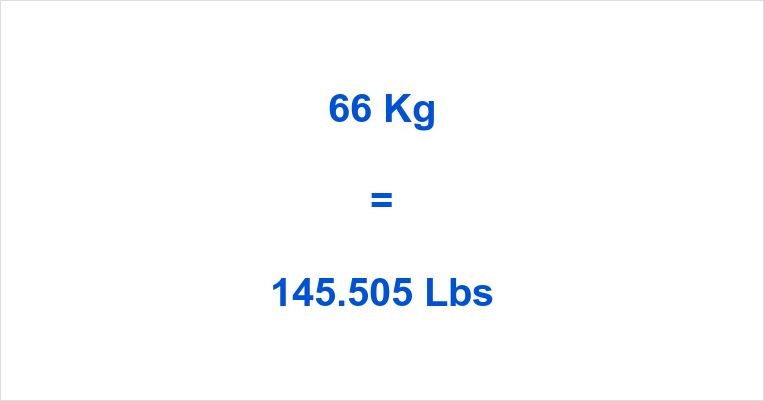Why Knowing How to Convert 66 Kg to Lbs is Useful

Are you tired of scratching your head every time someone mentions their weight in kilograms? Do you struggle to convert those numbers into pounds on the fly? Well, fret no more! Knowing how to convert 66 kg to lbs is not just a party trick but can come in handy in various aspects of life. In this blog post, we will explore why understanding this conversion is useful and practical. So sit tight and get ready for some math magic that will make your life easier!
What is 66 kg to lbs?
If you want to convert kilograms to pounds, there are a few steps that you need to take. First, divide the number 66 by 2.2 to get the first number in the conversion equation (kg). Then, divide the first number by 4 to get the second number in the conversion equation (lbs). Finally, multiply the second number by 10 to get pounds. So, if someone has 66 kgs and wants to convert them into pounds, their calculation would look like this:
66 ÷ 2.2 = 33.33
33 ÷ 4 = 11.11
11.11 x 10 = 110
How to Convert 66 kg to lbs
There are a few ways to convert kilograms to pounds. One way is to multiply kilograms by 2.2. Another way is to divide kilograms by 0.45. Knowing how to convert kilograms to pounds can be helpful if you need to calculate how much something weighs or if you need to compare the weight of two objects. 66 kg to lbs
If you want to calculate how much something weighs in pounds, you can use the following formula:
pounds = kilograms * 0.45
What is the BMI Scale?
The Body Mass Index (BMI) is a measure of weight in relation to height. Calculated using the following equation: BMI = kg/m2, the BMI ranges from 18.5 to 24.9, with 18.5 being the lowest and 24.9 being the highest. BMI is not always a good indicator of health risk because it does not take into account muscle mass or bone density. However, it is a good indicator of obesity risk and can be used as a screening tool to identify weight problems early on in life.
What is the BMI cutoff for obesity?
The BMI cutoff for obesity is 30.0.
Why Knowing Your BMI is Important
There are several reasons why knowing your BMI is important. First, it can help you to understand your risk for developing health problems, such as obesity or heart disease. Second, it can provide you with information about your body composition (the percentage of body weight made up of fat, muscle, and bone). Finally, your BMI can help you to make healthy lifestyle choices.
Your BMI is a measure of your body weight in relation to your height. It is calculated by taking your weight in kilograms and dividing it by the square of your height in meters (kg/m2). The higher the BMI number, the more overweight or obese you are.
The table below shows the range of BMIs that corresponds to different levels of obesity.
BMI Categories <18.5 Underweight 18.5-24.9 Normal Weight 25-29.9 Overweight 30-34.9 Obese 35-39.9 Very obese 40+
